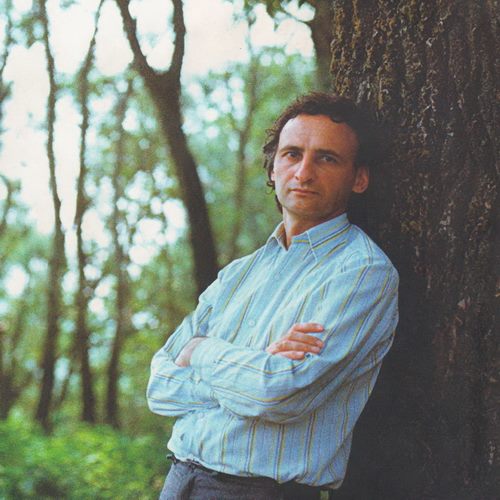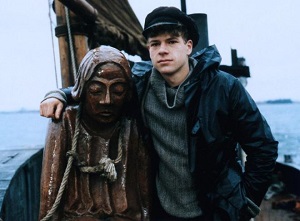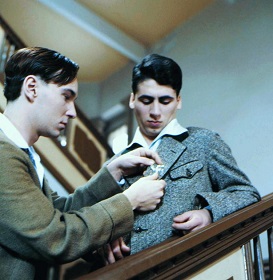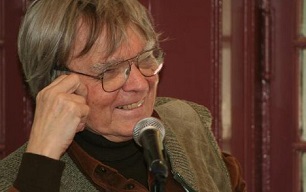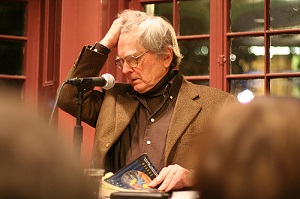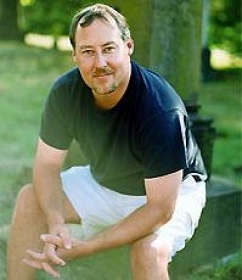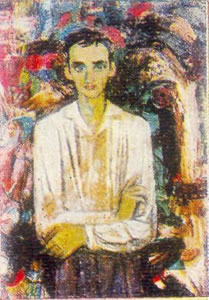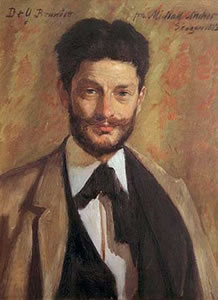De Amerikaanse schrijver Robert Coover werd geboren op 4 februari 1932 in Charles City, Iowa. Zie ook alle tags voor Robert Coover op dit blog.
Uit: Going for a Beer
“He finds himself sitting in the neighborhood bar drinking a beer at about the same time that he began to think about going there for one. In fact, he has finished it. Perhaps he’ll have a second one, he thinks, as he downs it and asks for a third. There is a young woman sitting not far from him who is not exactly good-looking but good-looking enough, and probably good in bed, as indeed she is. Did he finish his beer? Can’t remember. What really matters is: Did he enjoy his orgasm? Or even have one? This he is wondering on his way home through the foggy night streets from the young woman’s apartment. Which was full of Kewpie dolls, the sort won at carnivals, and they made a date, as he recalls, to go to one. Where she wins another—she has a knack for it. Whereupon they’re in her apartment again, taking their clothes off, she excitedly cuddling her new doll in a bed heaped with them. He can’t remember when he last slept, and he’s no longer sure, as he staggers through the night streets, still foggy, where his own apartment is, his orgasm, if he had one, already fading from memory. Maybe he should take her back to the carnival, he thinks, where she wins another Kewpie doll (this is at least their second date, maybe their fourth), and this time they go for a romantic nightcap at the bar where they first met. Where a brawny dude starts hassling her. He intervenes and she turns up at his hospital bed, bringing him one of her Kewpie dolls to keep him company. Which is her way of expressing the bond between them, or so he supposes, as he leaves the hospital on crutches, uncertain what part of town he is in. Or what part of the year. He decides that it’s time to call the affair off—she’s driving him crazy—but then the brawny dude turns up at their wedding and apologizes for the pounding he gave him. He didn’t realize, he says, how serious they were. The guy’s wedding present is a gift certificate for two free drinks at the bar where they met and a pair of white satin ribbons for his crutches. During the ceremony, they both carry Kewpie dolls that probably have some barely hidden significance, and indeed do. The child she bears him, his or another’s, reminds him, as if he needed reminding, that time is fast moving on. He has responsibilities now and he decides to check whether he still has the job that he had when he first met her. He does. His absence, if he has been absent, is not remarked on, but he is not congratulated on his marriage, either, no doubt because—it comes back to him now—before he met his wife he was engaged to one of his colleagues and their co-workers had already thrown them an engagement party, so they must resent the money they spent on gifts. It’s embarrassing and the atmosphere is somewhat hostile, but he has a child in kindergarten and another on the way, so what can he do?”
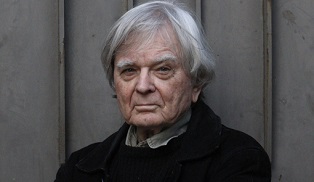
Robert Coover (Charles City, 4 februari 1932)
De Amerikaanse schrijver Stewart O’Nan werd geboren op 4 februari 1961 in Pittsburgh, Pennsylvania. Zie ook alle tags voor Stewart O’Nan op dit blog.
Uit: City of Secrets
“When the war came Brand was lucky, spared death because he was young and could fix an engine, unlike his wife Katya and his mother and father and baby sister Giggi, unlike his grandparents and aunts and uncles and cousins. A Latvian and a Jew, he was interned first by the Russians, then the Germans, then the Russians again. By chance, he lived. While he was tempted almost daily (really, nightly), he wasn’t enough of a fatalist to return the gift. The winter after the war, with no home to go back to and no graves to venerate, he signed on a Maltese freighter and landed in Jerusalem, realizing his mother’s lifelong dream. In their dining room in Riga hung a bad lithograph of the walled city like a fortress out of Beau Geste, its stone golden in the numinous desert light. At the end of the seder, his Grandfather Udelson raised his glass to it.
“Next year in Jerusalem.” For Brand it was next year, without sweetness.
Like so many refugees, he drove a taxi, provided, like his papers, by the underground. His new name was Jossi. His job to listen—again, lucky, since as a prisoner he had years of experience. With his fair hair and grade school Hebrew, he could be trusted. The British soldiers, the blissful pilgrim gawking tourists all wanted to talk. They spoke to him as if he were slow, leaning in close behind his ear, shaping each syllable.
Where was he from? What did he think of the trials? How did he like living in Jerusalem?
“I like it;” the man he was pretending to be said, instead of “It’s better than the camps,” or “I like living,” or, honestly, “I don’t know.”
The city was a puzzle box built of symbols, a confusion of old and new, armored cars and donkeys in the streets, Bedouin bankers. The Turks and Haredim, the showy Greek and Russian processions—everyone seemed to be in costume, reenacting the miraculous past. The very stones were secondhand, scavenged and fit back into place haphazardly, their Roman inscriptions inverted.”

Stewart O’Nan (Pittsburgh, 4 februari 1961)
De Nederlandse dichter en schrijver Louis Ferron werd op 4 februari 1942 geboren in Leiden. Zie ook alle tags voor Louis Ferron op dit blog.
Uit: Turkenvespers
‘Overal waar je kijkt,’ zei ik tegen juffrouw Kamenow die toevallig de gang op kwam toen ik op weg was naar mijn zolderkamer, ‘overal waar je kijkt, nachtmerries en visioenen. Heeft een oppassend burger dan geen recht meer op gemoedsrust?’
Juffrouw Kamenow begreep me anders dan ik bedoeld had en vroeg met opgetrokken neus of ik haar onder de nachtmerries dan wel onder de visioenen rangschikte. Ik dacht aan mijn zolderkamer die ik niet graag verliezen wilde en zei dat ze een van de meest extatische visioenen vertegenwoordigde die ik ooit beleefd had. Juffrouw Kamenow sloeg haar handen ineen en kirde, ‘o, maar mijnheer Hauser, u mag geen grapjes maken met alleenstaande dames, dat is helemaal niet netjes van u.’
‘Kom, kom, juffrouw Kamenow, zo oud bent u nu ook weer niet.’ En dat had ik natuurlijk nooit moeten zeggen want even later zat ik met een kopje chocolade voor mijn neus.
‘Er is veel misverstand tussen ons, mijnheer Hauser,’ begon juffrouw Kamenow, terwijl ze een biscuitje naar haar mond bracht.
‘Ja, veel misverstand,’ beaamde ik.
‘Maar dat moet de wereld uit.’ En ze sloot haar lippen rond het biscuitje.
‘Ach, wat zal ik u zeggen juffrouw Kamenow, er is zoveel dat de wereld uit moet.’
‘Ziet u wel dat we best met elkaar overweg kunnen?’
Haar lippen weken uiteen, ze had een geprononceerd gebit.
‘Als ik maar niet steeds van die vreemde berichten op de deur van het toilet hoef te lezen.’
‘O, dat spijt me toch zo, mijnheer Hauser. Ik heb er verkeerd aan gedaan. Kunt u me vergeven?’ Ze hield het biscuitje tussen haar tanden geklemd en wrong haar handen. Op haar wangen verschenen blosjes en de chocolade smaakte of er een schijfje komkommer in was uitgeknepen. Ik dacht, welke gek heeft mij eens verwekt, daar in de Dorotheeengasse. Kon hij hebben voorzien dat het lot mij eens in de armen van iemand als juffrouw Kamenow zou drijven? Waarom was toch niemand bij machte zijn eigen geschiedenis te schrijven?
Ze had vaal haar en bij de geringste opwinding verschenen er rode vlekken in haar hals. Ze wasemde een geur van ongewassen camisoles uit. Ze was weliswaar niet uitgesproken lelijk, maar was toch wat gesleten door het voortdurend redderen en doen in haar kamerverhuurbedrijfje. Mitzi mocht dan wel zeggen dat dat een aardig inkomentje opleverde, maar Mitzi hoefde niet met haar onder één dak te verkeren.”
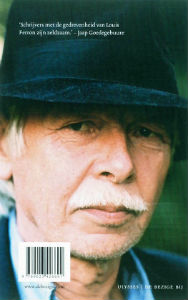
Louis Ferron (4 februari 1942 – 26 augustus 2005)
Cover achterzijde
De Duitse schrijver en journalist Norman Ohler werd geboren op 4 februari 1970 in Zweibrücken. Zie ook alle tags voor Norman Ohler op dit blog.
Uit: Die Gleichung des Lebens
„Die Luft war feucht aber bereits drückend warm, die Oder roch nach Seetang, Fisch, Algen, Erde und Meer. Frühnebel hing über dem Bruch. Als Kunz, der mit allen Wassern gewaschene Aufseher des großen Fischmarktes von Wrietzen, in den frühsten Stunden dieses hochsom-merlichen 7. Juli 1747 und noch ohne seinen teutschen Caffee getrunken zu haben, die routinemäßige Kontroll-fahrt entlang der Ufer der Faulen See unternahm, stieß er auf etwas ganz und gar Ungewöhnliches. Seine Augen, die sonst so tief in den Höhlen lagen, dass sie kom-plett darin verschwanden, wenn er lachte, traten weit nach vorne. Schrecken sprach daraus und Angst, obwohl er sonst ein Mann war, der andere das Fürchten lehrte. Nein, er war kein zimperlicher Mensch. In Wrietzen und im gesamten Bruch kannte man ihn als einen, vor dem man sich in Acht nehmen musste, denn ihm war zur Durchsetzung der Kegeln seines Machtbereiches —des Fischhandels bis hoch nach Freyenwalde, Oderberg und sogar Schwedt — so gut wie jedes Mittel recht. Stets führte er in seiner Stiefeltasche das rechte Fischmaß bei sich, eine Eisenstange von der Länge eines Unterarms, und wenn Hechte oder andere Herrenfische unter dieser Größe zum Verkauf angeboten wurden, scheute er sich nicht, mit ebendiesem Maß die Strafe gleich selbst aus-zuteilen, wie es Wrietzens Bürgenneister Fritze ja auch von ihm verlangte. Wenn Kurz ausgestattet mit einem exzellenten Ruderstil und zwei kräftigen Oberarmen, in seinem wendigen Nachen um eine Biegung schnellte und die Bewohner des Bruches dabei erwischte, wie sie illegal gerissenen Hecht abschlugen, kannte er keine Gnade. Auch im Pranger sah er kein überholtes Instrument aus vergangenen finsteren Zeiten, das in der Ära der Auf-klärung, jenem hell strahlenden 18. Jahrhundert, nichts mehr zu suchen gehabt hätte, sondern betrachtete die-sen als ein noch immer effizientes Strafwerlczeug mit der gewünschten abschreckenden Wirkung. Er handelte übrigens nicht so, weil er seine Freude an der Gewalt gehabt hätte, sondern schlicht aus Loyalität zu eben jenem Fritze, dem er ergeben diente, einfach weil er glaubte, das gehöre sich so.“
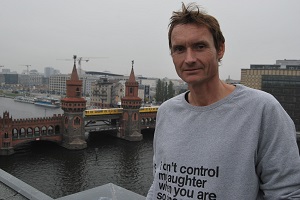
Norman Ohler (Zweibrücken, 4 februari 1970)
De Oostenrijkse toneelschrijver Werner Schwab werd geboren in Graz op 4 februari 1958. Zie ook alle tags voor Werner Schwab op dit blog.
Uit: Fäkaliendramen
„ERSTE SZENE Während das Publikum Platz nimmt, hört man die Übertragung einer Messe, die der Papst mit irgendeiner Masse’ feiert. Die Fernsehsendung geht zu Ende und der Vorhang auf. Ernas groteske Wohnküche. Erna schaltet das TV-Gerät aus. Mariedl sucht unter dem Tisch etwas. Grete sitzt am Tisch.
ERNA So viele Menschen. So viel Menschen sind zusammengekommen und zusammengeblieben und haben eine Gemeinschaft gemacht bei den Füßen des Heiligen Vaters.
GRETE Und die Bilder so wunderbar. Die Farben wie aus dem Leben so schön.
ERNA Eine ergreifende Friedlichkeit entsteht bei so vielen Menschen. Der Friede ist der Sinn des Lebens, und das Leben ist der Sinn für die Menschlichkeit.
GRETE (hebt das Tischtuch und spricht unter den Tisch hinein) Jetzt laß doch den Knopf, Mariedl, so wichtig ist mir der Knopf nicht. Vergiß jetzt den Knopf und setz dich zu uns. (Zu Erna) Das war aber wirklich gescheit von dir, Erna, daß du dir die Pelzhaube und den Farbfernseher angeschafft hast. Jetzt kommt der Genuß auch in deine Wohnung. Jetzt mußt du dich dem Leben hingeben, Erna, damit das Leben dich genießen kann.
ERNA Ja freilich, aber das sagt sich so leichtfertig daher. In Wirklichkeit ist es schon schwer, einen Lebensgenuß aufzunehmen, wenn einem das Sparen in das Fleisch und in das Blut übergegangen ist. Aber einmal im Leben muß ja auch so einen Menschen das Glück erreichen, der immer nur den Schmutz der anderen Menschen wegputzen muß.
Erna stellt sich vor dem Spiegel auf) Die Pelzhaube, die habe ich aufgefunden vor einem Jahr bei der Mülldeponie. Da darf aber jetzt niemand glauben, daß die Haube jemand einfach so weggeschmissen hat, da ist sie viel zu wertvoll. Da haben sicher nur so böse junge Menschen der Haube einen Streich gespielt. (Sie kehrt dem Spiegel den Rücken und setzt sich) Aber was glaubst du, wie dreckig die Pelzhaube am Anfang war. Dreieinhalb Stunden hab’ ich mich geplagt, bevor ich die Haube der Polizei ausgeliefert habe. (Grete macht Anstalten, den Pelz der Haube mit zwei Fingern zu prüfen. Erna bückt sich, um Gretes Vorhaben zu erleichtern.”
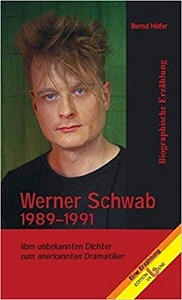
Werner Schwab (4 februari 1958 – 1 januari 1994)
De Duitse schrijver Alfred Andersch werd geboren op 4 februari 1914 in München. Zie ook alle tags voor Alfred Andersch op dit blog.
Uit: Sansibar oder der letzte Grund
„Es ist möglich, dachte Gregor, vorausgesetzt, man ist nicht bedroht, die licht stehenden Kiefern als Vorhang anzusehen. Etwa so: offen sich darbietende Konstruktion aus hellen Stangen, von denen mattgrüne Fahnen unterm grauen Himmel regungslos wehten, bis sie sich in der Perspektive zu einer Wand aus flaschenglasigem Grün zusammenschlossen. Die fast schwarz makadamisierte Straße deutete man dann als Naht zwischen den beiden Vorhanghälften; man trennte sie auf, indem man sie mit dem Fahrrad entlang fuhr; nach ein paar Minuten würde der Vorhang sich öffnen, um den Blick auf das Szenarium freizugeben: Stadt und Meeresküste.
Da man jedoch bedroht war, dachte Gregor, war nichts wie etwas anderes. Die Gegenstände schlossen sich in die Namen, die sie trugen, vollkommen ein. Sie wiesen nicht über sich selbst hinaus.
Es gab also nur Feststellungen: Kiefernwald, Fahrrad, Straße. Wenn der Wald zu Ende war, würde man die Stadt und die Küste erblicken – keine Kulissen für ein Spiel, sondern den Schauplatz einer Drohung, die alles in unabänderliche Wirklichkeit einfror. Ein Haus würde ein Haus sein, eine Woge eine Woge, nichts weiter und nichts weniger.
Erst jenseits des Hoheitsgebietes der Drohung, sieben Meilen von der Küste entfernt, auf einem Schiff nach Schweden – wenn es ein Schiff nach Schweden geben sollte –, würde das Meer, zum Beispiel das Meer, sich wieder mit einem Vogelflügel vergleichen lassen, einer Schwinge aus eisigem Ultramarin, die den Spätherbst Skandinaviens umflog. Bis dahin war das Meer nichts anderes als das Meer, eine bewegte Materiemasse, die man zu prüfen hatte, ob sie geeignet war, eine Flucht zu tragen.“
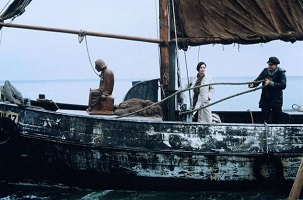
Alfred Andersch (4 februari 1914 – 21 februari 1980)
Scene uit de gelijknamige film uit 1987
De Moldavische dichter en schrijver Grigore Vieru werd geboren in Pereita op 4 februari 1935. Zie ook alle tags voor Grigore Vieru op dit blog.
Transplantation
Man musste mir in die Brust,
Ein anderes Herz einstellen.
Sonst
Folgte ich zu sterben.
Mutter,
Hat ihr Herz gegeben.
Aber, es tut noch weh.
Besonders als die Erde
Vom Regendurst brennt.
Besonders, wenn der Vater
Von Kriegen nicht zurückkommt.
Besonders, wenn ich
Ins Ausland reise
Und monatelang,
Nach Hause nicht schreibe.
Besonders tut es weh,
Wenn die Sonne untergeht.
Solche Schmerzen
Habe ich niemals gehabt.
Aber auch
Eine solche Geduld.
Mutters Stern
– Irgendwo, im weiten All,
Mutter, brennt dein weißer Stern,
Und so nimmst du den Zufall,
Dass du ähnlich siehst wie er.
Tags und nachts, im Untergang,
Brennt für das, was heilig werde,
Leuchtend uns, noch vom Anfang,
Das Gesicht der alten Erde.
– Brennen wir! Da lang und breit
Nichts ist schlimmeres Unglück:
Als ein Stern mit fremden Brand
Und ein Weh, ohne Grundstück.
Vertaald door Nicolae Dabija
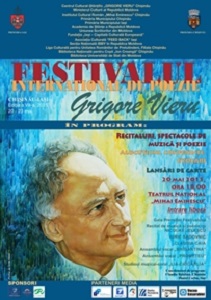
Grigore Vieru (4 februari 1935 – 18 januari 2009)
Poster voor een naar de dichter genoemd poëziefestival
De Canadese dichter E. J. Pratt werd op 4 februari 1882 geboren in Western Bay, Newfoundland. Zie ook alle tags voor E. J. Pratt op dit blog.
The Truant (Fragment)
And when, one day, grown conscious of your age,
While pondering an eolith,
We turned a human page
And blotted out a cosmic myth
With all its baby symbols to explain
The sunlight in Apollo’s eyes,
Our rising pulses and the birth of pain,
Fear, and that fern—and—fungus breath
Stalking our nostrils to our caves of death —
That day we learned how to anatomize
Your body, calibrate your size
And set a mirror up before your face
To show you what you really were — a rain
Of dull Lucretian atoms crowding space,
A series of concentric waves which any fool
Might make by dropping stones within a pool,
Or an exploding bomb forever in flight
Bursting like hell through Chaos and Old Night.
‘You oldest of the hierarchs
Composed of electronic sparks,
We grant you speed,
We grant you power, and fire
That ends in ash, but we concede
To you no pain nor joy nor love nor hate,
No final tableau of desire,
No causes won or lost, no free
Adventure at the outposts — only
The degradation of your energy
When at some late
Slow number of your dance your sergeant—major Fate
Will catch you blind and groping and will send
You reeling on that long and lonely
Lockstep of your wave—lengths towards your end.
‘We who have met
With stubborn calm the dawn’s hot fusillades;
Who have seen the forehead sweat
Under the tug of pulleys on the joints,
Under the liquidating tally
Of the cat—and—truncheon bastinades;
Who have taught our souls to rally
To mountain horns and the sea’s rockets
When the needle ran demented through the points;
We who have learned to clench
Our fists and raise our lightless sockets
To morning skies after the midnight raids,
Yet cocked our ears to bugles on the barricades,
And in cathedral rubble found a way to quench
A dying thirst within a Galilean valley —
No! by the Rood, we will not join your ballet.’
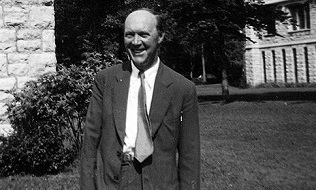
E. J. Pratt (4 februari 1882 – 26 april 1964)
De Deense schrijver, criticus en filosoof Georg Brandes werd geboren op 4 februari 1842 in Kopenhagen. Zie ook alle tags voor Georg Brandes op dit blog.
Uit: Die Jesus-Sage (Vertaald door Erwin Magnus)
„Dieser Paulus mit all seiner Feurigkeit ist, soweit man sehen kann, eine unheimliche Persönlichkeit gewesen, einer jener krankhaften Menschen, bei denen die Begeisterung in Abscheu, der Haß dagegen in aufbrausende Schwärmerei umschlägt. Alles historische Wissen ist ja unsicher, das Wort ist wahr daß die historische Sicherheit auf der Schweigsamkeit des Todes beruht. Aber was die Quellen uns melden, ist folgendes: Als der unglückliche Stephanus wegen seines abweichenden Messiasglaubens gesteinigt werden sollte, legten die ersten von den Henkern die Mäntel, die sie bei der Steinigung störten, einem jungen Fanatiker Saul zu Füßen, der Gefallen an dem Morde fand, und deshalb nach seiner eigenen Aussage gern die Kleider derer verwahrte, die ihn ausführten. Er sah es in seiner blinden Leidenschaft für seine Schuldigkeit an, etwas gegen die Nazaräer zu tun. Das tat er denn auch in Jerusalem, wo er sich vom Hohenpriester eine Vollmacht verschaffte, um viele von den Heiligen ins Gefängnis werfen zu lassen; er soll, wenn sie gesteinigt wurden, seine Stimme dafür abgegeben haban. Man nimmt an, daß dies im Jahre 37 geschehen sei. Im Jahre 38 erfolgte seine plötzliche Bekehrung. Sowohl vor wie nach ihr war er ein Eiferer von Fach.
Er war im Jahre 10 oder 12 in Tarsus in Kilikien geboren. Erst, als er sich zum Apostel der Heiden machte, latinisierte er seinen Namen Saul in Paulus. Seine Familie stammte aus Gischala in Galiläa und glaubte, dem Stamm Benjamin anzugehören. Sein Vater war römischer Bürger, hatte diesen Titel entweder durch erwiesene Dienste erworben oder auch vielleicht von einem seiner Vorfahren geerbt, der ihn sich gekauft hatte. Die Familie gehörte, wie alle besseren jüdischen Familien, zur Partei der Pharisäer. Selbst als er mit der Partei gebrochen hatte, behielt er doch noch ihren Eifer, ihre seelische Spannung, die Schärfe ihrer Ausdrucksweise. Tarsus war damals eine blühende Stadt, die Bevölkerung griechisch und arainäisrh Die Juden waren dort wie in allen Handelsstädten zahlreich_ Der Sinn für Literatur war verbreitet, und keine Stadt, selbst nicht Athen oder Alexandria, war reicher an wissenschaftlichen Institutionen.”
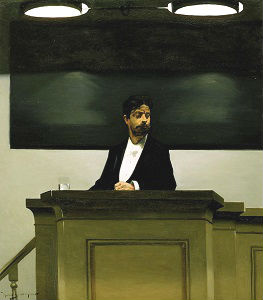
Georg Brandes (4 februari 1842 – 19 februari 1927)
Georg Brandes aan de universiteit van Kopenhagen door Harald Slott-Møller, 1889
Zie voor nog meer schrijvers van de 4e februari ook mijn blog van 4 februari 2018 deel 2 en ook deel 3.

